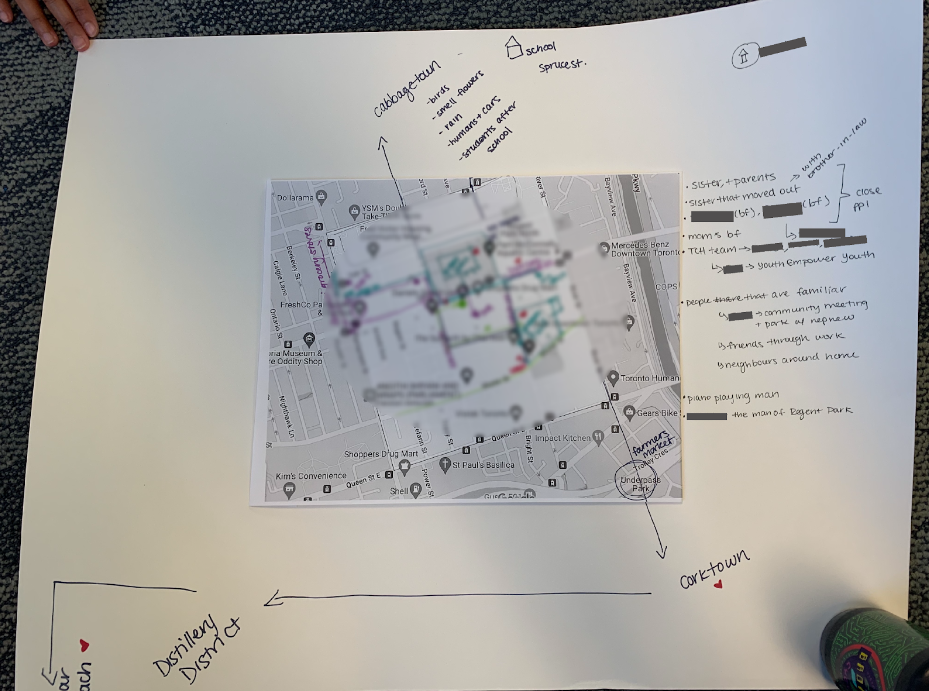Catch up with the Team: Care + Dementia in Suburbs Project
By: Justine Bochenek
Hi! We wanted to use this opportunity to welcome everyone to the Care and Dementia in the Suburbs project! This blog post is for you to get to know more about the project, the team, and to get a sense of what we’ve been up to these past few months.
About the Project
The Care and Dementia in the Suburbs project is the first study to examine how neighbourhoods affect the wellbeing of immigrants living with dementia, their families, and professional care workers in suburbs. The project is led by Dr. Samantha Biglieri, an Assistant Professor in the School of Urban and Regional Planning at Toronto Metropolitan University (formerly Ryerson). The project is funded by the Social Sciences and Humanities Research Council of Canada. The goal of the study is to help urban planners and municipalities understand how to build neighbourhoods that make people living with dementia feel more comfortable, safe, supported, and included.
We have just started recruitment for our study, and if you or someone you know is eligible to participate, please do not hesitate to jump to the “Join the Study” page on the project website. A reminder with are looking for: immigrants living with dementia and their informal caregivers, as well as formal careworkers in Scarborough.
Who are we?
We are a research team of five; three graduate students, one undergraduate student, and one professor all coming together to understand the complexities of living in the suburbs as a person living with dementia, as a care partner, and as a personal support worker caring for someone with dementia.
Dr. Sam Biglieri is our fearless leader. She is an Assistant Professor in the School of Urban and Regional Planning at Toronto Metropolitan University (TMU), and the Lead of the Health, Access + Planning (HAP) Lab. Salma Abdalla, Katrina Munshaw and Justine Bochenek are all second year graduate students studying under the supervision of Dr. Biglieri at TMU. While all of them share interests in community building, health and access in planning, they all bring their unique perspectives to our work on this project; with interests ranging from immigrant placemaking, to design and wayfinding, and theories of care. Raisa Chowdhury is our only undergraduate student, and an invaluable member of our team who helps us stay on track in our team meetings, manages our schedules and website, and from time to time, acts as a guinea pig in our research methods practice.
Team Training on Sketch + Social Network Mapping
Last month, Raisa volunteered to help us test our Sketch and Social Network Mapping Exercise on a human subject! This method will be one of our more involved phases of the study, where we will ask participants to map out the important places in their communities, along with the ties to the people that contribute to their wellbeing, familiarity and safety in the community. Combining a sketched map and a social network map will allow us as researchers to see neighbourhoods and networks as lived experiences for the participants. The result is a visual representation of life in their neighbourhood with all its complexities and multi-dimensionalities.
For people living with dementia, interviews can be challenging due to the methods’ reliance on abstraction, recall, and verbal reporting. A visual, sensory or participatory technique can engage participants living with dementia in research in ways that provide opportunities outside of just talking. The sketch and social network mapping strategy asks participants to engage with the research as artists, designers, storytellers, and even co-researchers, and we will use the method to break down existing perceived dichotomies between the researcher and the participant.
Below is Raisa’s sketch and social network map of her neighbourhood, near downtown Toronto. This is an example of the kinds of maps our participants will be creating when they join the study (details have been purposefully blurred and removed). On top of occasionally subjecting Raisa to grueling tasks like drawing on maps, the team has been working hard to prepare ourselves for the data collection phase of our research project; diving into the existing literature, applying for (and attaining!) research ethics approval, developing a recruitment strategy and more!
You can keep up to date with what our team is up to on the project website - www.careanddementiainsuburbs.com - or getting in touch with the team directly via email cs.dementia@gmail.com.
This is an image of Raisa’s sketch and social network map of her neighbourhood. Details have been purposefully blurred.

